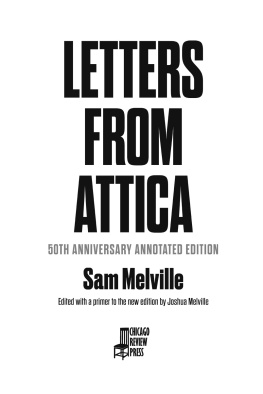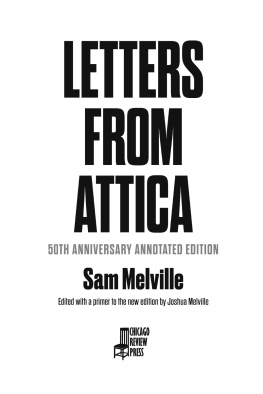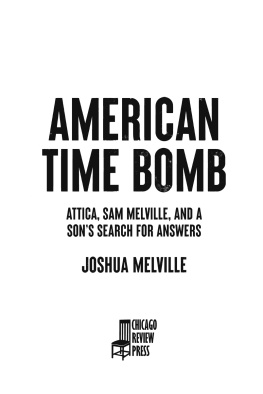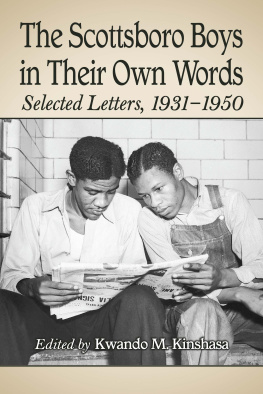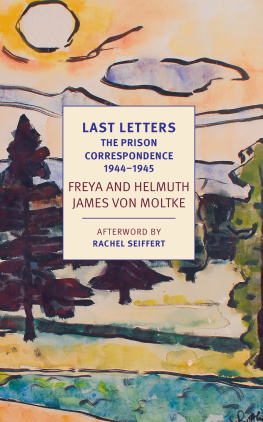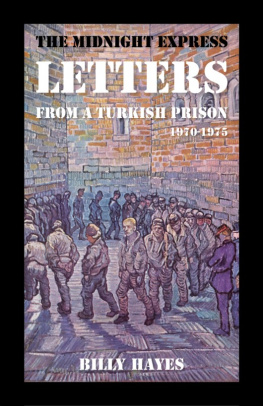ON HISTORICAL ACCURACY
A PRIMER TO THE NEW EDITION
by Joshua Melville
THE YEAR WAS 1973. I was eleven years old, looking at a picture of my fathers face on the cover of this book, Letters from Attica. He was smiling at me, while I looked back in sorrow. Moments earlier, my mother had told me that he was killed in prison and why he was there. The first thing I thought of was the last time we spoke. He was teaching me how to build a fire as we camped alone on the Appalachian Trail. Looking sadly at the flames, he leaned closer like he had a secret and whispered that he would be going away for a while but that I should remember that no matter what happenedno matter whathe would always love me. After Mom told me of his horrible death, our covenant made in the woods would be tethered to the letters he had written from his cell, now published for the world.
When several activists and educators suggested a reprint of his letters to coincide with the fiftieth anniversary of the Attica uprising, I was very pleased not only to learn that the man who carried me on his shoulders had remained relevant for nearly half a century but also to take their suggestion and write a new foreword to true up the things I learned that are contrary to the commonly accepted narrative of his life, work, and capture.
Up until now, there were only two sources for facts. The first is this books original editor, John Cohen, who contributed the 1972 introduction. He met my father around the events of the 1968 Columbia University takeover. Together, they formed a coalition to protest the universitys gentrification into Harlem and Morningside Heights. The second was one of my fathers lovers and a confessed coconspirator, Jane Alpert. Her Profile of Sam Melville for this book became a key source for journalists and historians. I, too, invested in Alperts reconstruction, since the first thing I saw when I opened this book as a child was her dedication, For Jocko Melville: my fathers pet name for me, which only he used. Since the profile was dedicated to me, I thought I would be reading a tribute. But her critical words confused me.
Alperts version of events centered around what she calls the collective. Her facts here and in her 1981 memoir blame my father for their arrest, citing what she characterizes as his impulsive, narcissistic, and chauvinistic disregard of her instincts. She also wrote that he demonstrated little patience for planning, safety, or becoming literate about the history of revolution. Her evidence is that my father conspired with the now-infamous FBI informant George Demmerle by inviting him to place bombs in a Manhattan armory; the two were arrested in the process along with Alpert and others. Alpert paints Demmerle as a fool whom everyone in the collective suspected of being an undercover agent. She feigns pity for my poor father, so desperate for a new follower that he could not see what was obvious to all. However, she knowingly omits that Demmerle was involved with several others in the collective who were never arrested, and also that Demmerle was a career informant who had tricked even the most experienced movement organizers, notably Bobby Seale, the Black Panther Party, and the Young Patriots. Both Abbie Hoffman and Jerry Ruben each peppered their memoirs with details about how Demmerle infiltrated the Yippies and became Hoffmans bodyguard during the Chicago Seven riots at the 1968 Democratic National Convention.
Through my adolescence I wrestled with her claim that my fathers gullibility led to everyones arrest. It made no sense, given the thoughtful, intellectual, and cautious man I had known him to be during my childhood.
After a three-decade investigationduring which I acquired my fathers DOJ files and court transcripts and tracked down and interviewed eleven collective members and dozens of other East Village and Chicago activists, girlfriends, and even FBI agents who worked his caseI learned that my father was not disaffected and depressed, as Alpert (and Cohen) portray, but was in fact an inspiring and trusted organizer for several important factions that defined the radical underground. Nor did he scoff at the idea of understanding history, as you will see from his personal prison library in the appendix created for this edition. My facts painted a new truth: Sam Melville successfully planned and planted bombs with several collectives in several states, but of the dozens of people with whom my father conspired the only three people arrested were connected to Alpert. This was not a coincidence. All three, including my father, were Jane Alperts simultaneous lovers.
Alpert had been under surveillance for months. Agents filed reports, noting how the four of them traded beds and volunteered for the underground newspaper Rat Subterranean News. But the thing that brought them to an arrest was Alperts monthly column in Rat. There, she openly discussed their bombings and predicted the collectives next three targets. It was her writings that solidified the FBIs eleven-month case, not my fathers one encounter with a random informant a day before the arrests. (The story of how I came to uncover these facts is the subject of my own memoir, American Time Bomb [2021].) Alpert knew that none of the readers of Letters from Attica in 1972 would have access to that data.
When she was asked to write her profile of Sam Melville, she delivered what you will read: a twenty-thousand-word profile (longer than my fathers letters themselves). Rather than talk about his principled multistate campaigns against imperialism and the illegal war in Vietnam, she focused on my fathers brief experimentation with LSD, her psychoanalysis of his mental state, andof all the irrelevant yet telling insights into her motivationshis infidelities. She wrote with a style that suggested her words were part of a consensus with others in the collective, others who were not indicted and so could not rebut her without admitting their participation in the bombings. Then she dedicated her revenge revisionism to me, personally: For Jocko Melville. An eleven-year-old child.
Theres no denying that I feel scarred by Jane Alpert, and after fifty years, it would bring me great personal closure if she would publicly come clean. But I have little hope. Through the decades Alpert (now in her seventies) has remained evasive about the inconsistencies between her 1972 account in this book and her 1981 account in her memoir. One possible explanation is that while her profile was crafted to push her narrative as the fulcrum of the collective, her memoir was crafted after she turned herself in and began assisting the FBI in the capture of others in the underground. In the late 1970s they were still hunting several cells virtually spawned by my father. Alperts memoir was an answer to their problems: a tell-all book by a renowned feminist radical who, like Patty Hearst, had now grown strong through her penance and desired to return to mainstream life. This would strongly discourage others from following her path and bolster the establishment propaganda that politically motivated bombings must be the product of doped-out hippies, libidinous chauvinists, and those who are mad.

